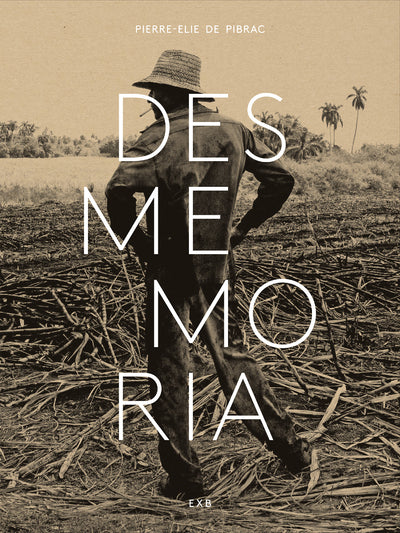Desmemoria
- Authors: De (auteur) Pierre-Elie de Pibrac, De (auteur) Zoé Valdes, Dessins de Alejandro Campins, Photographies de Pierre-Elie de Pibrac, Traduit par Aymeric Rollet
- Publishers: XAVIER BARRAL
- Date of Publication: 2019-11-14
- Pages: 204
- Dimensions: 289mm x 219mm
Desmemoria constitutes a testimony that is at once photographic, anthropological and
social on the community of azucareros of Cuba – the workers of
the sugar industry and early revolutionaries.
Between 2016 and 2017, Pierre-Élie de Pibrac traveled the island and lived with
various families in this community. Through this experience, the
photographer questions the end of utopias among a people who believed and worked for
that embodies the Castro dream. For decades, the sugar industry
was to be the flagship of the Cuban economy and was celebrated for this purpose
by Castro and his troops: "Sugar is our history, without it, it is
"It is impossible to understand the essence and soul of Cuba," the historian emphasizes.
Cuban Eusebio Leal Spengler. More than half a century later, this economy
sugar has not kept its promises of emancipation, like the ideology
Castroist. Immersed in rural areas, Pierre-Élie de Pibrac left
meeting the inhabitants of the bateyes (villages) of the sugar plants.
Still in operation or disused, these sugar cities and their workers
bear witness to lives sacrificed in the light of a utopian doxa. The bateyes are the
theaters of disenchantment of Cuban society. There reigns an atmosphere
heavy that underlines loneliness, poverty, isolation and precariousness. If
Sugarcane built Cuba and represented national pride,
Today, it is the symbol of its shipwreck, taking with it a
new generation without reference points. In this transitional period of history
Cuban, the images of Pierre-Élie de Pibrac show a world that is
delirium. They tell how the Cuban people now understand their
daily, what view he takes
on its recent history. The documentary and artistic approach of the
photographer allows another reading of the post-Castro era that is taking place today
in place. Through the prism of various image registers – photographs
made during this long stay and images extracted from the iconography
vernacular, Pierre-Élie de Pibrac shows a disenchanted but
also deeply attached to the singularity of its history.
This photographic work was awarded the Levallois Prize in 2018.
Unpublished text by Zoé Valdès
Share

